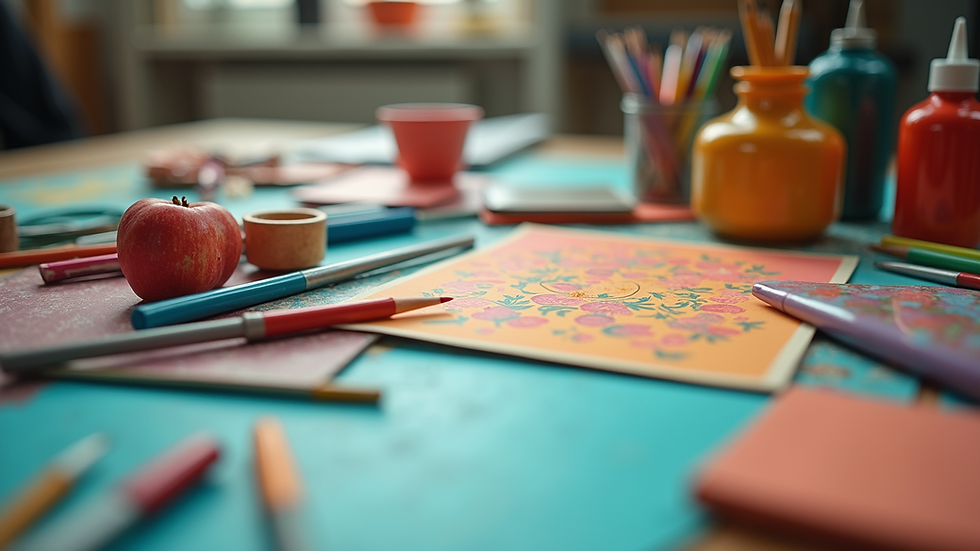Boost Your Child's Kindergarten Readiness with Smart Strategies
- K. Bennett
- Jul 24, 2025
- 4 min read
Updated: Jul 30, 2025
Preparing your child for kindergarten can feel overwhelming, but it doesn't have to be. With the right strategies in place, you can help your child develop the skills they need to thrive in their first school experience. In this blog post, we will explore effective kindergarten prep tips that can enhance your child's readiness and ease their transition into school life.
Kindergarten Prep Tips
Investing time in your child's education during their early years is crucial. Studies show that children who are well-prepared for kindergarten perform better academically and socially. As a parent, you can play a pivotal role in your child's preparation. Here are some practical tips to get started:
Read Regularly
One of the best ways to prepare your child for kindergarten is by nurturing a love for reading. Set aside time each day to read together. Choose books that are age-appropriate and engaging. Ask questions and encourage your child to predict what might happen next. This practice enhances vocabulary and comprehension skills.

A child immersed in reading, setting a foundation for literacy. Establish Routines
Children thrive on structure. Create a daily routine that includes time for homework, play, and relaxation. Consistent schedules help children feel secure and manage time effectively.
Encourage Independence
Teach your child how to do simple tasks independently. This may include putting on their shoes, brushing their teeth, and organizing their backpack. Building independence boosts self-confidence.
Play Together
Engage in interactive play that promotes learning. Board games, puzzles, and creative activities like drawing or building blocks enhance critical thinking and problem-solving skills.
Practice Social Skills
Kindergarten involves a lot of social interaction. Encourage your child to share, take turns, and communicate feelings. Arrange playdates with other children to provide opportunities for socializing and developing friendships.
What Constitutes Kindergarten Readiness?
Understanding what kindergarten readiness entails can help you identify areas where your child may need growth. Kindergarten readiness includes several key areas:
Social Skills: Children should be able to interact with peers and adults, share toys, and cooperate in group settings.
Language Skills: A readiness to communicate both verbally and non-verbally is essential. This includes expanding vocabulary and the ability to express needs and feelings.
Motor Skills: Fine motor skills are crucial for tasks such as writing, cutting, and manipulating objects. Activities like drawing or crafting can support the development of these skills.
Cognitive Skills: Problem-solving abilities, memory, and the capacity to follow multi-step directions are important cognitive skills needed for success in kindergarten.
Self-Regulation: Children should demonstrate the ability to manage their emotions and behavior in a group setting. This includes understanding how to wait for their turn and follow rules.
Fostering these skills at home can make a significant difference in your child's ability to succeed in a kindergarten environment.
Creating a Learning Environment
In addition to practicing specific skills, it's important to create a supportive learning environment at home. Here are some tips for establishing an effective space for your child's education:
Designate a Study Area: Create a calm and organized space where your child can focus on activities such as reading or homework. Ensure it is well-lit and free from distractions.
Use Educational Tools: Have easy access to books, art supplies, and educational games. Utilize technology responsibly with age-appropriate apps that encourage learning.

Educational tools ready for enhancing learning opportunities. Limit Screen Time: While technology has its benefits, limit screen time to encourage more hands-on learning and creativity. Engage in activities that prompt discussion and critical thinking rather than passive consumption.
Learning Through Play
Engaging in play is one of the most effective ways to prepare your child for kindergarten. Here’s how you can incorporate learning into fun activities:
Role-Playing: Use role-playing games to teach social skills, such as sharing and cooperation. Set up scenarios where your child can practice these skills in a playful context.
Outdoor Exploration: Nature walks offer excellent opportunities for learning. Encourage your child to observe plants, animals, and the weather. Ask them to describe what they see and encourage questions.
Craft Making: Crafting activities boost creativity and fine motor skills. Create projects together and discuss the steps involved, enhancing their understanding of following directions.

Craft supplies inviting creativity and learning through play. Cooking Together: Cooking can be a fun way to introduce numeracy skills through measurement and counting ingredients. Discuss the steps of the recipe, encouraging your child to follow along.
Adding Structure to Learning
Incorporating structure into your learning activities can help your child stay focused and engaged. Here are tips on how to offer structured learning experiences:
Set Learning Goals: Identify specific skills you want to develop each week. For example, focusing on letter recognition may be a goal for one week, followed by numbers the next.
Use Timers: Implement timers during tasks to manage time effectively. For example, spend 15 minutes on a reading activity, then shift to a different type of learning activity. This keeps it fresh and fun.
Track Progress: Keep a chart or journal to monitor progress. Celebrate achievements together, no matter how small. Positive reinforcement encourages continued effort and excitement.
Incorporate Music and Movement: Use songs and dances to reinforce concepts. This can make learning memorable and enjoyable for young children.
Final Thoughts on Supporting Kindergarten Readiness
Ultimately, the key to boosting your child's readiness for kindergarten is engaging them in various learning activities that are both fun and educational. By using smart strategies and nurturing an encouraging environment, you lay a solid foundation for your child to excel. Remember, every child is unique and will develop at their own pace, so be patient and supportive throughout this process.
Promoting kindergarten readiness through these strategies will benefit not only your child’s education but also strengthen your bond as you explore this exciting journey together. With your support and encouragement, your child will be ready to face the adventures of kindergarten with confidence and joy.



Comments